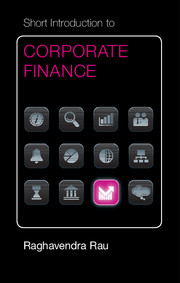Book contents
- Short Introduction to Corporate Finance
- Cambridge Short Introductions
- Short Introduction to Corporate Finance
- Copyright page
- Contents
- Figures
- Tables
- Preface
- Acknowledgments
- 1 Who Are the Players in Corporate Finance?
- 2 NPV and the Investment Decision of the Firm
- 3 Portfolio Theory and the Discount Rate
- 4 Capital Structure Theory
- 5 Option Pricing Theory
- 6 Asymmetric Information
- 7 Market Efficiency
- 8 Wrapping It Up
- Index
2 - NPV and the Investment Decision of the Firm
Published online by Cambridge University Press: 09 February 2017
- Short Introduction to Corporate Finance
- Cambridge Short Introductions
- Short Introduction to Corporate Finance
- Copyright page
- Contents
- Figures
- Tables
- Preface
- Acknowledgments
- 1 Who Are the Players in Corporate Finance?
- 2 NPV and the Investment Decision of the Firm
- 3 Portfolio Theory and the Discount Rate
- 4 Capital Structure Theory
- 5 Option Pricing Theory
- 6 Asymmetric Information
- 7 Market Efficiency
- 8 Wrapping It Up
- Index
Summary
These stakeholders represent everyone who has a stake in the success of the firm. Obvious examples are the workers, the managers, the shareholders, the customers, the suppliers, the bondholders, regulators, auditors, and so on. Some examples are not quite so obvious. For example, competitors also have a (negative) stake in the firm. A firm succeeding means that its competitors might be worse off. Competitors have incentives to complain that their rivals are pricing their products too low, bundling different services into a package to hide underlying costs, or engaging in any other activity that leaves the competitors worse off. The government also has a stake in the firm – if the firm fails, its employees will be out of jobs with the corresponding unemployment benefits being picked up by the taxpayers. If the firm is too successful, the government worries that these profits are at the expense of other competitors or workers.
- Type
- Chapter
- Information
- Short Introduction to Corporate Finance , pp. 14 - 41Publisher: Cambridge University PressPrint publication year: 2016

